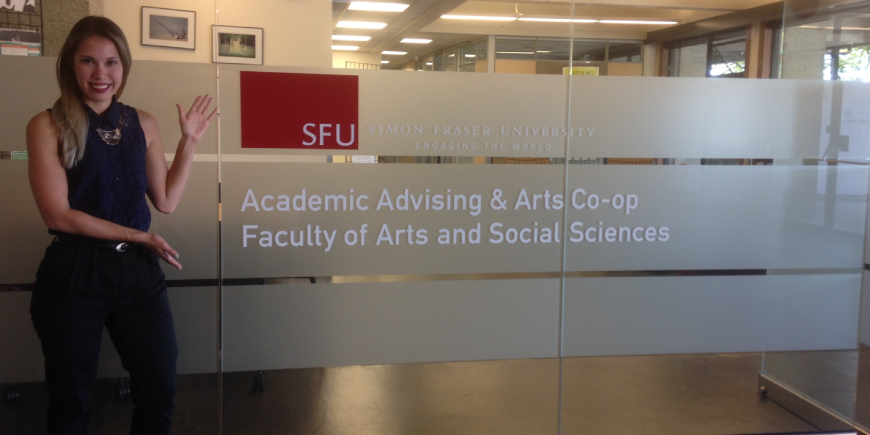
The standard time frame for completing your undergraduate degree is supposed to be four or five years if you’re diligent, hard working, and open to sleepless nights. I’m sure many of us come to university hoping to complete our degrees quickly, with our career goals and financial costs in mind. Let’s not drag this out, right? This is how I felt when I began at SFU seven (you read that right, seven) years ago. Having done five co-op work terms at three different job placements, I definitely spent more time as a student than I originally intended but it was well worth every extra year and penny spent. Let me try to convince you why the co-op program is worth your while.
Gain Work Experience and Make Money While Doing It
Co-op is first and foremost an opportunity to gain real world work experience, which, in this day and age, is invaluable. Many of us come to SFU without having ever held a full-time job or simply a job, period. In fact, I am willing to bet that many of us have never experienced the nine-to-five grind of what us millennials like to refer to as “adulting”. Having the chance to step away from academics and focus on working a regular full-time schedule is an eye opening experience; a taste of life after university.
Co-op jobs also pay and, in many cases, pay well. Taking time away from academics gives you a chance to save some money, help pay for your next semester and make a dent in those student loans (if you have them). It’s hard to keep up with having a full course load and working a job, but co-op is a guilt free way of putting your academics on hold and focusing on working, gaining valuable skills and did I mention making money? Taking time away from one or two full-time academic semesters also provides a refreshing mental break from having to write papers and study for exams; when you’re off work, you’re off. You might even get to read that novel you’ve wanted to read since Christmas.
Make Connections and Network with Industry Professionals
Co-op is also an opportunity to meet new people, from colleagues to supervisors and industry leaders. In today’s competitive job market, we are continuously told that networking is key to landing desired positions. It’s always beneficial when someone can put a face and a reputation to a name on a resume. The people you work with and for during your co-op placements can become great resources and references for future applications. Many of your colleagues and supervisors may move on to different positions, departments, companies and organizations you may want to work for, or even other countries you may want to work in. You might even get hired and continue working for the company or organization you did co-op with after your placement is over.
Discover New Things About Yourself
Personally, my favourite thing about co-op is the diversity in work placements and the chance to work in fields you never would have imagined. It’s a great way to find that “aha” moment you may be waiting for, or that you didn’t even know you were waiting for. There are so many opportunities across a variety of fields and areas of interest; you don’t need to restrict yourself to only Arts Co-op designated jobs.
The try something new, self discovery aspect of the co-op program is near and dear to my heart. As a Criminology student with dreams of working in law enforcement, I spent my first co-op placement in an elementary school for children with learning disabilities and special needs. Completely out of my comfort zone and not exactly related right? However, the experience and skills I gained were invaluable to any law enforcement career and this placement turned into one of the most rewarding experiences of my life. No matter how opposite to your career goals a job may appear to be, you can gain many transferable skills along the way.
Get the Know-How and Support to Apply for Jobs and Do it Well
Ask yourself: do you know (like actually know) how to put together a good resume and cover letter? I know I didn’t. Co-op requires you to take a couple courses on effective resume and cover letter writing, and interview techniques, which were both helpful and eye-opening. These courses teach you how to present yourself on paper and how to carry and sell yourself in person under the high pressure of an interview. Furthermore, Co-op Coordinators and Advisors offer invaluable one-to-one support to better your documents and prepare you for your interviews. Advisors and Coordinators continue to support you throughout your job placements and are available to assist with any concerns you may have.
Graduate With More Than Just a Degree
Finally, co-op provides you the opportunity to leave SFU with not only a degree, but irreplaceable experiences, a padded resume and a competitive employment background. We all begin as first year students sitting in lecture halls with 300 wide-eyed peers, the same 300 peers who will one day walk across the stage and be handed a piece of (very expensive) paper with a similar designation to our own. The job market is tough right now and it’s probably going to be the case that many or your peers will be vying for the same positions you are. With employers wanting qualified candidates with experience to fill these positions, the co-op program may just be what sets you apart from the rest.
Beyond the Blog
-
For more opportunities like Jaclyn's, visit the FASS co-op page!










